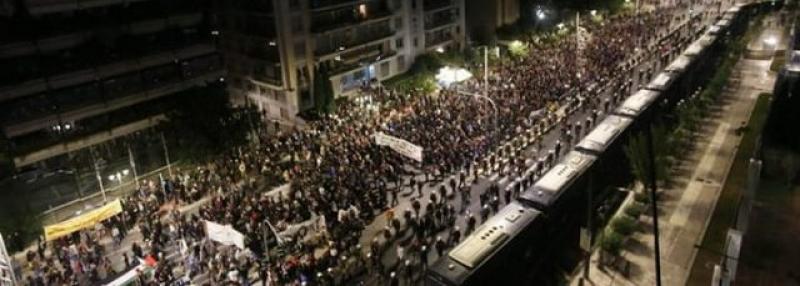50th 'November 17' Anniversary
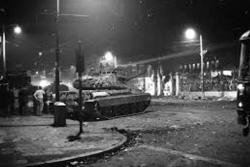 Members of the public and student groups started gathering at the building of the Athens Polytechnic University in central Athens from Thursday, during a three-day commemoration of the 1973 Student Uprising, which marks its 50-year anniversary this year. The annual event will be commemorated with a big rally in the city centre on Friday 17th November. Road traffic will be restricted gradually and be closed off entirely on the day, through to 06:00am on Saturday, along all the central Athens roads where the march will take place towards the U.S. Embassy. All surrounding streets around the U.S. Embassy were heavily barricaded and special measures were put in place to protect the Israeli Embassy, due to the present on-going war in Gaza, with over 5,500 police officers deployed to maintain order.
Members of the public and student groups started gathering at the building of the Athens Polytechnic University in central Athens from Thursday, during a three-day commemoration of the 1973 Student Uprising, which marks its 50-year anniversary this year. The annual event will be commemorated with a big rally in the city centre on Friday 17th November. Road traffic will be restricted gradually and be closed off entirely on the day, through to 06:00am on Saturday, along all the central Athens roads where the march will take place towards the U.S. Embassy. All surrounding streets around the U.S. Embassy were heavily barricaded and special measures were put in place to protect the Israeli Embassy, due to the present on-going war in Gaza, with over 5,500 police officers deployed to maintain order.
Many Greeks accused the United States of America of supporting the brutal Greek military junta, with the mass march usually ending up with clashes between police and anarchist groups. Resentment toward the United States continues to persist in Greece, as it is widely held responsible for supporting the oppressive rightwing military dictatorship from 1967 to 1974 during the Cold War.
'November 17' marks the 1973 Athens Polytechnic Uprising when students and workers held a massive demonstration against the ruling Greek military junta. The uprising began on 14th November 1973 and escalated to an open revolt against the brutal military junta, which had been ruling the country since 1967. It ended in bloodshed early on Saturday morning 17th November after a series of events that started with a tank crashing through the gates of the Polytechnic campus.
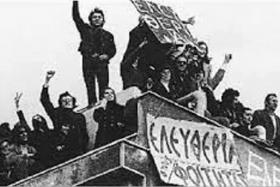
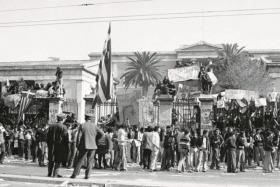
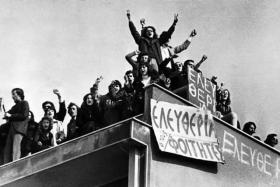
As the demonstration grew, on Friday 16th November, the police attacked the people gathered outside the Polytechnic with water cannons and batons. Many of the demonstrators were hospitalised with injuries. Barricades were immediately set up to prevent the police forces from approaching the building. This failed police intervention led the Junta’s leader, colonel Georgios Papadopoulos, to order the army to intervene to crush the revolt.
In the early hours of 17th November, three tanks were placed outside the Polytechnic. One of them pointed its cannon towards the main gate. The Student Coordinating Committee asked for negotiations, but their request was not granted. At 03:00 am, one of the tanks received the order to break down the main Polytechnic gate, while doing so, it crushed those climbed on and standing behind the gate. Immediately afterwards, terror and chaos prevailed as thousands of people were trying to escape the police and the ESA (Greek Military Police) brutality, as well as the snipers’ gunfire coming from rooftops of buildings around the Polytechnic. According to a study by the National Research Foundation, 24 people were killed in and around the Polytechnic. The total confirmed number of injured Greek civilians between 15th and 17th November was up to 1,103.
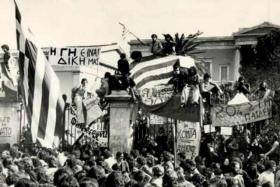
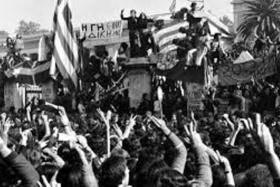
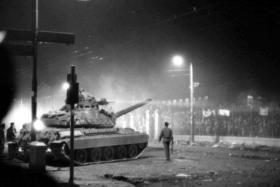
The events of the Polytechnic Uprising revealed how little popular base the dictatorship had, and it opened the floodgates for people to openly question its authority. This in turn led to an internal crisis of the regime. Colonel Dimitrios Ioannidis, the hard-liner head of the Millitary Police, staged a counter-coup to block Papadopoulos’ attempt for a controlled “liberalisation” of the regime. However, the Junta’s final act came some months later, after the tragic events in Cyprus. The regime attempted to harden its stance and proceeded to organise a coup on 15th July 1974, resulting in the overthrow of the President of the Republic of Cyprus, Archbishop Makarios III. This was the perfect excuse for the lurking Turkish army to invade Northern Cyprus on 20th July 1974.
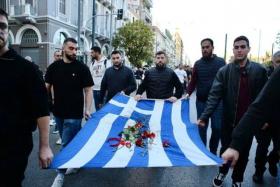
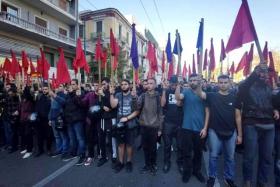
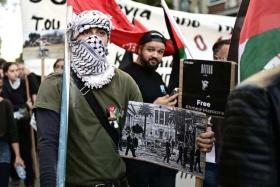
The students’ and workers’ heroism at the Athens Polytechnic Uprising is a source of inspiration for young activists to this day. It represents a living proof that people, when they come out in struggle, can bring down even the most repressive regimes. While the Polytechnic Uprising may not have overthrown the dictatorship, it created a nightmare that should not be repeated for some and opened up horizons of expectations for democracy for others. Without it, the transformation of 24th July 1974, and the return of democracy to Greece might have been much more limited. Until today, November 17 is a day of remembrance and struggle. Mass demonstrations are organised in big cities across the country, especially Athens which was the center of resistance. This way the struggles of the past and of today are linked, as their demand of 'Bread - Education - Freedom' is still relevent today as it was then.
